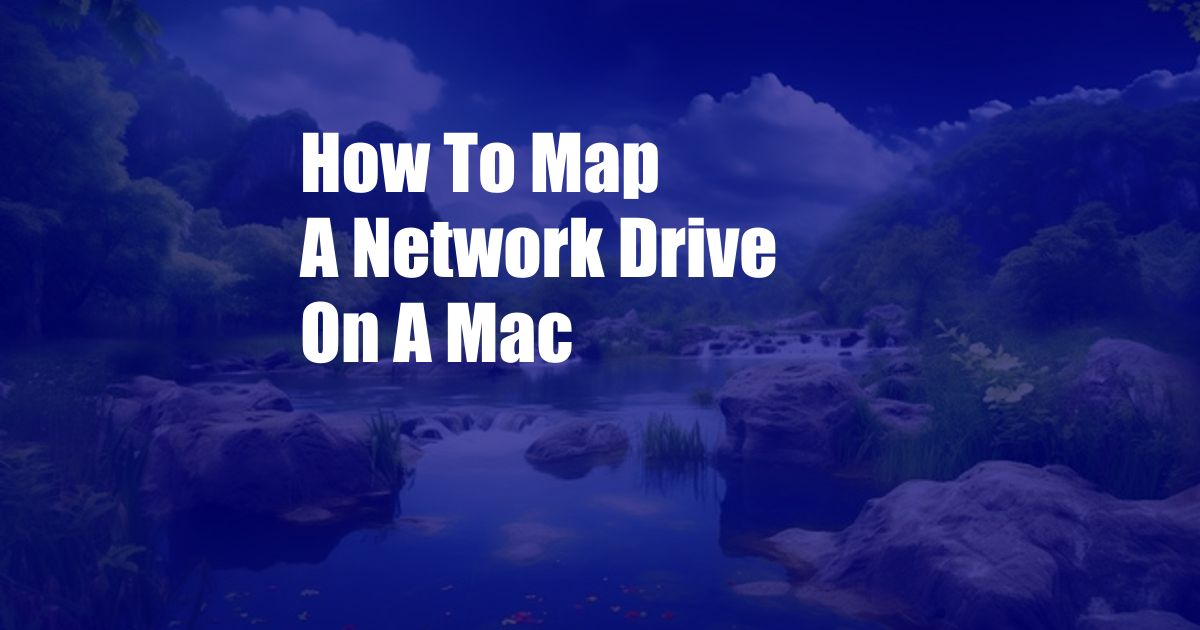
How to Effortlessly Mount a Network Drive on Your Mac
In the realm of working remotely or collaborating with others, accessing shared files and folders across networks becomes essential. If you’re a Mac user, mapping a network drive is a game-changer, simplifying your access to remote resources. Here’s a comprehensive guide to help you effortlessly mount a network drive on your Mac:
Understanding Network Drives
A network drive is a shared storage space accessible over a computer network, essentially making remote files appear as if they were stored locally on your device. Mapping a network drive establishes a permanent connection to a shared folder on another computer or server, allowing you to seamlessly access and manage files without navigating through complex network paths.
Mapping a Network Drive
-
Connect to the Network: First, ensure your Mac is connected to the same network as the computer or server hosting the shared folder.
-
Open Finder: Click on the Finder icon in your Dock or go to Applications > Finder.
-
Navigate to Go Menu: From the Finder menu bar, select “Go” > “Connect to Server.”
-
Enter Server Address: In the “Server Address” field, type the network address of the server or computer hosting the shared folder. This can be an IP address, host name, or URL.
-
Connect as Guest or Registered User: If the shared folder is accessible without credentials, click “Connect.” Otherwise, click the “Registered User” button and enter your username and password.
-
Select Shared Folder: Once connected to the server, select the shared folder you wish to mount and click “OK.”
-
Mount Drive: Check the “Show servers in Finder” option if you want the server to appear in the Finder sidebar. Click “Connect” to mount the network drive.
Latest Trends and Developments
The advent of cloud storage and file-sharing services has revolutionized the way we access shared network drives. Cloud-based network drives allow seamless collaboration and file access from any device with an internet connection. Additionally, the increasing popularity of remote work and distributed teams has made network drive mapping an indispensable tool for accessing shared resources.
Expert Tips for Effortless Mapping
-
Use Keyboard Shortcuts: Speed up the process by using keyboard shortcuts. For example, Command + K opens the “Connect to Server” dialog box.
-
Remember Server Credentials: Store your server credentials in the macOS Keychain to eliminate the need to enter them repeatedly.
-
Check Firewall Settings: Ensure that your firewall settings allow inbound and outbound connections on the appropriate ports.
-
Enable SMB Support: If you’re experiencing connection issues, try enabling SMB (Server Message Block) support in System Preferences > Sharing.
-
Use Time Machine for Backups: Consider using Time Machine to back up your network drives, as they are not included in the default Time Machine backups.
Frequently Asked Questions
Q: Why can’t I connect to the network drive?
A: Verify that both devices are connected to the same network, the shared folder is accessible, and you have the necessary permissions.
Q: How can I mount a network drive permanently?
A: After mapping the network drive, select the “Connect Automatically” checkbox in the “Connect to Server” dialog box.
Q: Can I access a network drive over the internet?
A: Yes, you can use VPN (Virtual Private Network) to establish a secure connection to your home or office network and access the network drive remotely.
Conclusion
Mapping a network drive on your Mac is a straightforward process that empowers you to access shared files and folders conveniently. By following these steps and leveraging expert tips, you can effortlessly establish and maintain network drive connections, enhancing your productivity and collaboration.
If you’re interested in learning more about network drive mapping or have any further questions, don’t hesitate to connect with us for additional support.